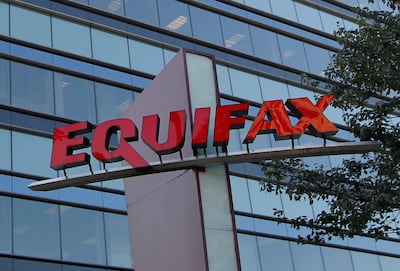Americans curious to find out if they’re among the 147 million people whose personal identifying information was compromised in Equifax's massive 2017 data breach can now find out on a new website.
The site, www.EquifaxBreachSettlement.com, also lets people file claims for restitution or set up credit-monitoring services, according to New York Attorney General Letitia James, who helped secure a $700 million (Dh3.1 billion) settlement with Equifax.
The data breach at Equifax, one of the major credit reporting companies, exposed sensitive information belonging to about half of the US population.
Ms James, who investigated the breach alongside the Federal Trade Commission and 48 other states, said the hack compromised social security numbers, names, dates of birth, addresses and credit card numbers - the kind of information that can be used for identity theft.
“Consumers will need to deal with the fallout of this breach for years to come, and this website is just the first step in helping provide consumers with the tools to recover,” Ms James said.
People can file claims for as much as $20,000 to compensate them for money lost due to identity theft or fraud, according to the statement.
Equifax agreed earlier this month to pay as much as $700m to resolve the investigations, including $425m to compensate consumers.
With the breach affecting most adults with credit in the US, the compensation is key. It includes the option to be on a list to get free credit monitoring and/or monetary compensation. So how does it work?
How does this affect me?
If you had any lines of credit in the US in 2017, such as a credit card, mortgage or bank loan, then your data could have been compromised in the breach. To see if you're included, visit the Equifax Data Breach Settlement website. The compensation you apply for may not be what you end up with. Watch for qualifiers like "up to" and know the limitations of the settlement. All affected consumers can get free credit monitoring. Or, if they already have credit monitoring, they can apply for alternative compensation of up to $125. You are choosing between a guaranteed minimum amount of free credit monitoring or compensation that could be well less than $125, depending on how many people apply.
What value does the free monitoring actually offer?
It gives you four years of free monitoring from Experian that covers the three major credit bureaus, Equifax, Experian and TransUnion. The lowest price Experian advertises on its website for that coverage is $19.99 a month. After the three-bureau monitoring expires, you can opt to have up to six years of one-bureau monitoring from Equifax.
What if I want cash instead?
If you already have credit monitoring and plan to keep it for at least six months, you can choose the cash option. You can get either a prepaid card or a cheque for your reimbursement.
You must have the monitoring in place when you apply. Note that it does not need to be credit monitoring that you pay for, according to Federal Trade Commission spokeswoman Juliana Gruenwald. The free monitoring you can get from some personal finance sites qualifies.

What is the likely value of a cash payout?
Settlement terms say that alternative reimbursement claims will be paid from a $31m "bucket". If there are enough claims to empty that bucket, the amount each person gets will drop as the pool of money is distributed proportionally. However, the payout could be as much as $20,000 if you can prove your identity was stolen and you suffered because of it.
What are the odds of securing the $125?
There would need to be no more than 248,000 approved claims out of the 147 million consumers affected — or less than one-fifth of 1 per cent — for approved applicants to get the full $125.
What about the time I spend protecting myself after the breach?
You can get "up to" $25 per hour you spent on:
• Dealing with fraud that was "fairly traceable" to the breach, up to 20 hours, and you'll need documentation.
• Freezing and/or unfreezing your credit, comparing and/or purchasing identity theft protection services, up to 10 hours, and you must certify that you are being truthful.
There is another $31m bucket of money to cover claims for time spent. If it is exhausted, payouts will be reduced proportionally.
What about other costs incurred because of the breach?
The limit is $20,000 per person, and you'll have to provide documentation. These out-of-pocket expenses can include credit monitoring after the breach, legal expenses, postage, notaries and more.
Those claims will be paid from the $380.5m fund Equifax has set up to pay for monitoring services and to compensate consumers. If that payment is not enough to pay initial claims, there is an additional $125m available. The money is split into various buckets for different kinds of claims, in much the same way that a budget might work with the envelope system.
The settlement administrator will decide if your claim for out-of-pocket losses is valid.
Is there a deadline for filing a claim?
Yes, you have until January 22, 2020 to file for any of these remedies. You can apply online, print out an application form and mail it, or request that a form be mailed to you.
When will I receive the benefits?
Not right away. If you choose monitoring, you'll get information on how to activate it once the court finalises the settlement. A final approval hearing is scheduled for December 19.
Cheques or prepaid cards for alternative reimbursement, time spent or out-of-pocket losses could take "several months or more", according to the breach settlement website.
What if I have breach-related losses after that deadline?
If there is any money left to compensate consumers after the initial rounds of claims, there will be an extended claims period for losses that occur after the first deadline.
Consumers will be able to seek reimbursement for new out-of-pocket losses or time spent, but not for time and money spent protecting their credit such as by purchasing credit monitoring. You'll have to certify that you have not already received reimbursement for the claimed loss. Claims must be made by January 22, 2024 and will be paid on a first-come, first-served basis.
How can I protect myself now?
You can freeze your credit. Freezing credit can keep identity thieves from opening credit accounts in your name. It's free and doesn't hurt your score. As long as you are not actively seeking credit, there's little reason not to freeze it. If you need to unfreeze briefly, that process is also free.
In contrast, credit and identity theft monitoring are more useful for telling you when access has already happened.

